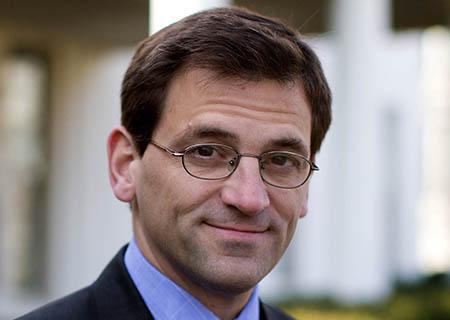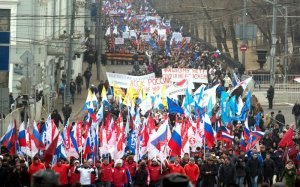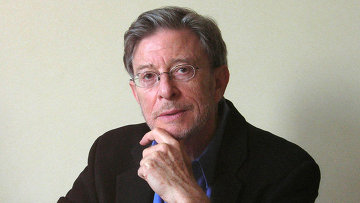
Peter Baker
.
 WASHINGTON — The Obama administration has drawn up plans to escalate sanctions againstRussia by targeting its financial, energy and defense industries, but faces resistance from European allies hoping to avoid a broader economic clash with Moscow that would hurt their own businesses.
WASHINGTON — The Obama administration has drawn up plans to escalate sanctions againstRussia by targeting its financial, energy and defense industries, but faces resistance from European allies hoping to avoid a broader economic clash with Moscow that would hurt their own businesses.
Even as the Kremlin voices support for a cease-fire in eastern Ukraine, American officials remain unconvinced that it has backed up words with deeds. Russia has moved troops back to the border and positioned heavy artillery there in what American officials consider an effort to help the separatists, who on Tuesday shot down a Ukrainian military helicopter.
But President Obama faces hurdles as he tries to keep the pressure up on the government of President Vladimir V. Putin. European Unionleaders, who are scheduled to meet Friday in Brussels, are reluctant to go along if it looks like Mr. Putin may be backing down. And American business leaders objecting to unilateral actions that would hurt their companies are kicking off an advertising campaign to oppose Mr. Obama’s plans.
Mr. Obama spoke with Mr. Putin on Monday to urge him to take more tangible steps to defuse the crisis, and the Russian leader on Tuesday seemed to respond by asking his Parliament to rescind formal authorization to intervene militarily in Ukraine. American officials considered the move positive but symbolic, assuming that it was really meant to undercut European support for additional sanctions.
As Secretary of State John Kerry and other American diplomats visited Brussels to talk with their European counterparts, Mr. Obama called Prime Minister David Cameron of Britain on Tuesday to consult on the next steps in the crisis, which could be decided this week. Both men indicated afterward that Russia had yet to take the sort of actions demanded by the Group of 7 industrial nations this month to avoid additional sanctions.
"What we’re focused here on is not just the words of the Russian president, though we welcome them,” said Josh Earnest, the White House press secretary. "What we’re focused on are the actions.”
Mr. Cameron’s office said Russia had not halted the flow of militants and arms into Ukraine nor stopped training separatist groups. The American and British leaders "reaffirmed their commitment to implementing further sanctions on Russia if these things don’t happen,” Mr. Cameron’s office said in a statement.
The Obama administration has developed three options for further actions, according to government officials: banning any interactions with some of Russia’s largest banks; cutting off technology transfers to Russian energy and defense firms; and shutting down business with Russian defense companies.
Any of these actions would go far beyond the narrow penalties meted out to date against individual Russian officials, businessmen and their companies. But they would fall short of the most powerful sanctions available, like those imposed on Iran. American officials have concluded that Iran-style sanctions would not be as effective against Russia, which has a broader economy. Instead, they are looking for actions that will have demonstrable impact but also avoid disrupting global markets.
Congressional aides briefed by the administration said the planned moves would be a forceful increase in pressure on Russia but not a full-scale economic attack. While the plans will not assuage some lawmakers who have called for tougher action, the aides said they would go a long way toward satisfying many.
Whether the Europeans would go along remained an open question. American officials expressed optimism that they were finding common ground with the allies but recognized that it was unlikely that the European Union, with 28 member states that operate by consensus, would take the same actions as the United States. The Europeans may also move to defer the toughest steps.
European Union foreign ministers met to discuss Ukraine on Monday. When European heads of state meet on Friday, crucial to any decision will be Chancellor Angela Merkel of Germany, whose country has extensive energy and economic ties to Russia. Mr. Obama spoke last Friday with Ms. Merkel as well as with President François Hollande of France to press for continued unity. Vice President Joseph R. Biden Jr. called President Petro O. Poroshenko twice in two days.
American officials were urging their European counterparts not to give too much credit to Mr. Putin for positive statements in recent days. Twice before, the Americans argued — in April and then again this month when he attended a D-Day commemoration in France — Mr. Putin has seemed to embark on what they called a "charm offensive” to deflate any momentum within the European Union toward tougher sanctions.
If the Europeans are not willing to impose new sanctions after Friday’s meeting, the American side hopes to reach agreement on a package that would be ready to use if Mr. Putin does not follow through on his recent positive statements or reverts back to more hostile actions once the meeting has passed. In effect, that would make the sanctions package a deterrent.
Some analysts said the support for sanctions has diminished in Europe. Macro-Advisory Ltd., a consultant firm in Moscow, told clients that there might be "so-called scalpel sanctions later this week” but predicted that "the emergence of political pragmatism in Kiev and Moscow” would avert "more serious trade- and economy-disrupting sanctions.”
The drive for more sanctions comes as American businesses are growing more vocal in protesting the possibility that the United States may act on its own. While lobbying the White House and Congress quietly until now, leading business groups plan to start a wide advertising campaign voicing their concerns.
"With escalating global tensions, some U.S. policy makers are considering a course of sanctions that history shows hurts American interests,” reads an advertisement to be placed in major newspapers on Thursday. "We are concerned about actions that would harm American manufacturers and cost American jobs.”
The ad, signed by Jay Timmons, president of the National Association of Manufacturers, and Thomas J. Donohue, president of the U.S. Chamber of Commerce, will be placed in The Financial Times, The Hill, The New York Times, Politico, Roll Call, The Wall Street Journal and The Washington Post. A copy was provided on Tuesday by someone not directly affiliated with either sponsoring organization.
Linda Dempsey, the vice president for international economic affairs at the manufacturers association, would not discuss the ad campaign but said American businesses would be unduly harmed if Washington proceeded with sanctions that were not matched by Europe.
"Unilateral sanctions by the United States end up with other countries and their industries filling the void,” she said. "The harm and the real impact of those unilateral sanctions is on U.S. industries and U.S. workers. It’s not that we’re out of the market for a year or two. We could get out of the market for decades.”












